 Petzlover
Petzlover Bergamasco is originated from Italy but Eurasier is originated from Germany. Both Bergamasco and Eurasier are having almost same height. Bergamasco may weigh 6 kg / 14 pounds more than Eurasier. Both Bergamasco and Eurasier has almost same life span. Both Bergamasco and Eurasier has almost same litter size. Both Bergamasco and Eurasier requires Moderate Maintenance.
Bergamasco is originated from Italy but Eurasier is originated from Germany. Both Bergamasco and Eurasier are having almost same height. Bergamasco may weigh 6 kg / 14 pounds more than Eurasier. Both Bergamasco and Eurasier has almost same life span. Both Bergamasco and Eurasier has almost same litter size. Both Bergamasco and Eurasier requires Moderate Maintenance.
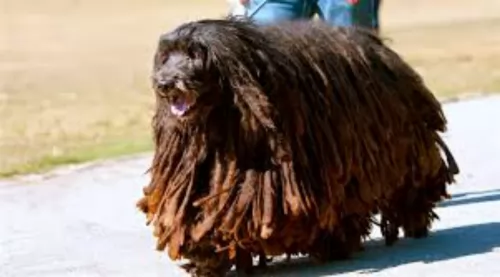 The Bergamasco comes from northern Italy. This medium sized sheepdog is of ancient origin. Known as an Italian sheep herding breed, his name actually comes from the town where he comes from - Bergamo.
The Bergamasco comes from northern Italy. This medium sized sheepdog is of ancient origin. Known as an Italian sheep herding breed, his name actually comes from the town where he comes from - Bergamo.
It was after World War II that there was danger that this breed would disappear as the need for herding and shepherding was diminishing. An Italian breeder, however, Dr. Maria Andreoli, stepped in to save the breed.
It was in 2015 that the American Kennel Club also changed the breed’s status from Miscellaneous to the Herding Group.
 The Eurasier is a dog which hails from Germany and is a cross between the Wolf Spitz, the Chow Chow and the Samoyed.
The Eurasier is a dog which hails from Germany and is a cross between the Wolf Spitz, the Chow Chow and the Samoyed.
The puppies of the dog could reproduce themselves, so that a new breed was recognized by the German Kennel Club as well as the Federation Cynologique Internationale.
It is believed that the name was chosen as a referral to the dog’s European and Asian background. Today the Eurasier is found in most European Union countries as well as in Canada and the United States, but still the breed’s population is low, with efforts in place to raise its numbers.
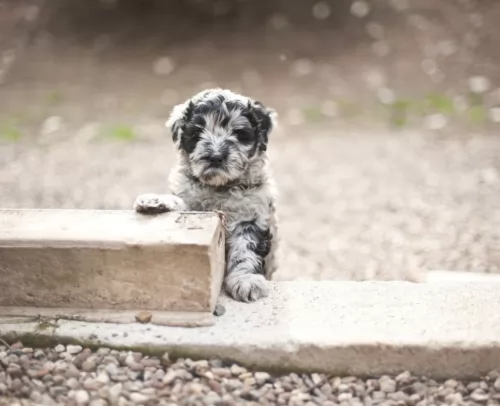 This medium sized sheepdog stands 54 – 62cm in height and weighs up to 38 kg as an adult. It is his coat which draws the most attention. It is of a coarse texture and actually greasy to the touch. It actually forms into strands or almost like dreadlocks from the top of the body, so that people agree he is one of shaggiest dog breeds there are.
This medium sized sheepdog stands 54 – 62cm in height and weighs up to 38 kg as an adult. It is his coat which draws the most attention. It is of a coarse texture and actually greasy to the touch. It actually forms into strands or almost like dreadlocks from the top of the body, so that people agree he is one of shaggiest dog breeds there are.
From age 1 on the coat starts to become woolly, and then the flocks start to form. As these clumps of hair appear, it will become necessary to separate them into smaller cords by hand to ensure attractive formation Brushing isn’t necessary but a big toothed comb can keep their hair ‘groomed’.
The colour of the coat is solid grey with patches of shades of grey and sometimes black. His dense, heavy coat makes it that he is suited to cooler climates. Because he is a herding dog, he wouldn’t do well in an apartment but would suit a home with a large garden.
He is intelligent and social but will need firm handling as he is a boisterous dog. He has a muscular yet compact body with a large head, long tail, high-set semi-drooping ears and large, gentle looking brown eyes. Although not instinctively aggressive, he makes an excellent watch dog with strong protective instincts to protect his human family.
He views new people into his circle with suspicion and wariness. He is good with kids and pets in the home and is playful and energetic.
 The Eurasier is a medium-sized dog, standing at roughly 48cm to 60cm in height and weighing 18kg to 32kg. He has a medium to long length coat in a range of different colors – fawn, black and tan as well as a mix of colors such as silver and black.
The Eurasier is a medium-sized dog, standing at roughly 48cm to 60cm in height and weighing 18kg to 32kg. He has a medium to long length coat in a range of different colors – fawn, black and tan as well as a mix of colors such as silver and black.
He has medium-sized, erect ears and the tail is always held over the back. The nose is black and the eyes are also medium in size and dark and should never be obscured by the dog’s hair.
Confident while being reserved around strangers, the calm Eurasier isn’t an aggressive dog.Bred as a companion animal, he is tolerant of other pets in the house as well as with children, and having him socialized and trained will ensure that he is obedient, relaxed and amicable. He is an intelligent dog and responds well to training.
He loves to be with his human family and will adapt happily to city- or country life. He doesn’t have high activity levels so daily walks and ball games will be sufficient for him.
He isn’t the kind of dog that you can keep in your backyard as a watchdog and then just neglect him. He’ll become bored and destructive through no fault of his own.
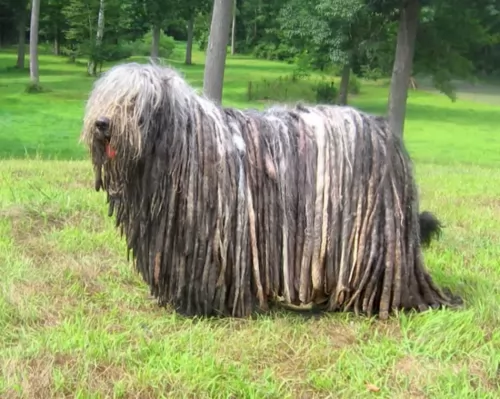 This is a working dog so they are naturally alert. He is also intelligent and independent and this independence is seen with training as he doesn’t take easily to following instructions, becoming stubborn. You’ll certainly want to have your Bergamasco socialized and trained as he can be a boisterous dog, bounding with energy.
This is a working dog so they are naturally alert. He is also intelligent and independent and this independence is seen with training as he doesn’t take easily to following instructions, becoming stubborn. You’ll certainly want to have your Bergamasco socialized and trained as he can be a boisterous dog, bounding with energy.
This is a dog that will need to be kept busy and provided with plenty of activities so that he remains happy, playful and relaxed.
Lively and intelligent, these dogs also form strong bonds with their owners and get on well with the children in the home. He will take well to country life as opposed to living in the city.
 You can just see on the face of the Eurasier that he is a loving, gentle dog who wants to be part of a loving human family.
You can just see on the face of the Eurasier that he is a loving, gentle dog who wants to be part of a loving human family.
As a companion dog he makes a splendidly devoted and loyal pet, wanting to be involved in everything his human ‘pack members’ are doing. He is healthy, intelligent, playful and loving and when you invest in such a pet, you’re investing in a close, loving relationship for many years.
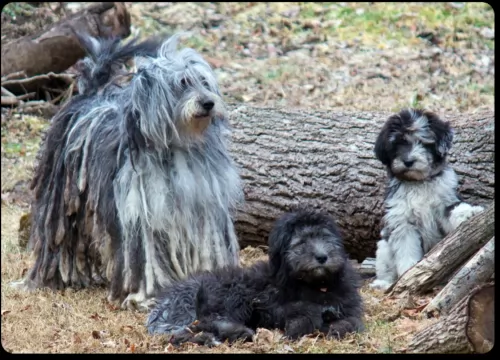 Your Bergamasco can live to be 13 to 15 years of age and he is considered to be a healthy breed. Nonetheless you want to be aware of health issues that are common to this breed
Your Bergamasco can live to be 13 to 15 years of age and he is considered to be a healthy breed. Nonetheless you want to be aware of health issues that are common to this breed
he is vulnerable to heat. He can die of heat exhaustion quicker than other breeds
keep an eye on him for hip dysplasia, progressive retinal atrophy and skin allergies
 To a large extent, we have the health of our pets in our hands. The way we treat them – the food we give, the activities he takes part in, his sleeping facilities and the attention we give him all contribute to whether he will be healthy or not.
To a large extent, we have the health of our pets in our hands. The way we treat them – the food we give, the activities he takes part in, his sleeping facilities and the attention we give him all contribute to whether he will be healthy or not.
Nonetheless there are dogs who enjoy the best life and yet they still get sick. The Eurasier is a healthy dog breed who can push 12, 13 or 14 years, but still there are some common dog diseases to look out for.
Problems which are of concern are hip- and elbow dysplasia and patellar Luxation. Patellar luxation is when the dog's kneecap becomes dislocated and you see your pet holding up his hind leg for a while. These dislocated kneecaps are quite common in dogs and can lead to arthritis and even lameness.
Your vet can diagnose this problem through different means to help your pet.
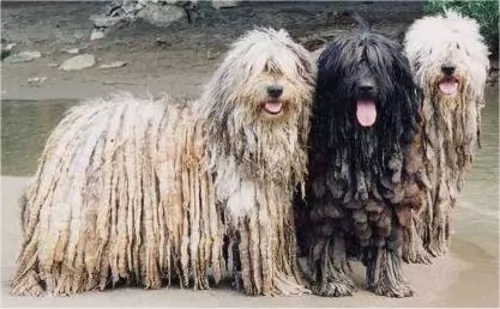 The Bergamasco isn’t a shedder but his coat will need to be combed once a week just to keep it in order. You don’t want to bath him too often, especially during the Winter as his coat takes a long time to dry. It isn’t recommended to shave a Bergamasco as the coat regulates the dogs temperature – keeping him warm and cold as the weather demands.
The Bergamasco isn’t a shedder but his coat will need to be combed once a week just to keep it in order. You don’t want to bath him too often, especially during the Winter as his coat takes a long time to dry. It isn’t recommended to shave a Bergamasco as the coat regulates the dogs temperature – keeping him warm and cold as the weather demands.
They thrive on a blend of kibble (dry) mixed with raw and-or moist food once or twice a day. Remember to include quality chicken, turkey, etc. mixed with some vegetables and rice into your dog’s diet. Ensure a constant supply of fresh water in an easily-cleanable bowl.
Balls and ropes are important for building muscle strength and burning energy. Remember your Bergamasco is a working breed and will need plenty of games and exercise.
 The Eurasier, just like any other dog, requires high quality food. Luckily, as far as convenience goes, there are some excellent commercially manufactured foods, but you still need to check out the ingredients on the packaging as you want to avoid some of the dog foods high in chemicals and fillers.
The Eurasier, just like any other dog, requires high quality food. Luckily, as far as convenience goes, there are some excellent commercially manufactured foods, but you still need to check out the ingredients on the packaging as you want to avoid some of the dog foods high in chemicals and fillers.
The best pet foods are the ones that are high in protein, and meat sources such as chicken, beef or salmon for instance should show up among the top 5 ingredients.
Your Eurasier won’t want to eat kibble every day of his life so add in your own homemade cooked brown rice, vegetables and chicken from time to time. Also, every now and again, it will be of tremendous value to your pet’s immune system to include some raw meat.
Brush your Eurasier twice a week to keep his coat shiny and healthy. Grooming your pet has a number of benefits apart from making him look good. It infuses him with a healthy glow – he literally glows with a sense of wellbeing and confidence because you care for him.
The benefits of brushing your pet include better blood circulation and a shinier, healthier coat. Also check your dog’s nails, check his ears inside and out and make sure to attend to his teeth 2 or 3x a week. There are special toothbrush and toothpaste designed specifically for dogs.